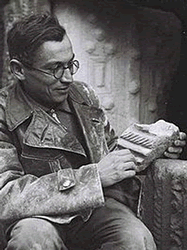
Binyamin Mazar (Maisler)
born to Chaim Maisler and Rivka (nee Glikson) in Grodno
June 28, 1906
September 11, 1995 Benjamin Mazar, a prominent historian and archeologist who pioneered a synthesis of biblical research with historical geography in Israel, died on Friday in Jerusalem. He was 89.
A scholar of Jewish history in the biblical period and a former president of the Hebrew University, Professor Mazar was best known in Israel for directing large-scale excavations along the ancient western and southern walls of the area known to Jews as the Temple Mount in the Old City of Jerusalem.
The decade-long dig near the Jewish shrine of the Western Wall was begun after Israel captured the Old City in the 1967 Arab-Israeli war. It yielded finds going back to the period of the First Temple in the seventh and eighth centuries B.C.
Archeologists familiar with Professor Mazar's work said he had founded a research discipline in Israel that used geography and archeology to trace the course of biblical history as told in the Jewish Scriptures and other ancient texts.
"His main contribution was the synthesis of biblical and archeological research," said Professor Mazar's nephew, Amihai Mazar, also an archeologist. "He laid the foundations for integrative research that combined the study of archeology, the Bible, ancient Near Eastern sources and historical geography."
Professor Mazar was born in Russia in 1906. He received a doctorate at University of Giessen in Germany before moving in 1929 to Palestine, then under British mandate, where he became secretary of the Palestine Exploration Society.
He joined the Hebrew University in 1943, and in 1951 he was appointed professor of the history of the Jewish people in the biblical period and the archeology of Palestine. He became rector of the university in 1952 and served as president from 1953 to 1961 before retiring in 1974.
In 1968 he was awarded Israel's highest cultural award, the Israel Prize, for his work in the field of Jewish studies. He was a founder of Israel's first Government department of antiquities and became president of the Israel Exploration Society in 1959.
He directed excavations at several sites in Israel, and published more than 300 articles and collections of his writings. Two volumes appeared in English: "Biblical Israel: State and People," published by the Magnes Press in Jerusalem in 1982, and "The Early Biblical Period: Historical Essays," published in Jerusalem in 1986 by the Israel Exploration Society. He was also chief editor of the Biblical Encyclopedia.
Professor Mazar is survived by a son, Ori Mazar, a brother, Hanoch Mazar, five grandchildren and seven great-grandchildren Benjamin Mazar, born Binyamin Zeev Maisler, (June 28, 1906 - September 9, 1995) was a pioneering Israeli historian, recognized as the "dean" of biblical archaeologists. Mazar was born in Ciechanowiec, Poland. He shared the national passion for the archaeology of Israel that also attracts considerable international interest due to the region's biblical links. He is known for his excavations at the most significant biblical site in Israel:south and south west of the Temple Mount in Jerusalem.
In 1932, he conducted the first archaeological excavation under Jewish auspices in Israel at Beit She'arim (the largest catacombs ever found in Israel) and in 1948 was the first archaeologist to receive a permit granted by the new State of Israel (Tell Qasile, 1948). Mazar was trained as an Assyriologist and was an expert on biblical history, authoring more than 100 publications on the subject.
He developed the field of historical geography of Israel. For decades he served as the chairman of the Israel Exploration Society and of the Archaeological Council of Israel (which he founded as the authority responsible for all archaeological excavations and surveys in Israel). Between 1951 and 1977, Mazar served as Professor of Biblical History and Archaeology at the Hebrew University in West Jerusalem. In 1952 he became Rector of the University and later its president for eight years commencing in 1953.
He founded the Hebrew University's new campus at Givat Ram and Hadasah Medical School and Hospital at Ein Karem and led the academic development of the university into one of the leading Universities of the World (see Academic Ranking of World Universities). He was regarded by his students as an inspiring teacher and academic leader and many of these students are now considered leading historians and archaeologists in Israel today.
Archaeological career
In 1936 Mazar started the excavations of Beth Shearim, the first archaeological excavation organized by a Jewish institution, and uncovered there the large Jewish catacombs dated to the 2nd-4th centuries AD, known as the burial place of the Jewish leader Rabbi Yehudah Hanasi.
In 1949 he was the first archaeologist to receive a permit to dig in the new State of Israel, and explored the Philistine town of Tell Qasile in northern Tel Aviv. Later he conducted excavations at Ein Gedi and between 1968 and 1978 directed the excavations south of the Temple Mount in Jerusalem and near the southwestern corner of the Temple Mount which uncovered extensive remains from the Second Temple period.
Mazar family
Benjamin Mazar's son Ory Mazar, granddaughter Eilat Mazar, grandsonDan Mazar and nephew Amihai Mazar all played an important role in the study of or dissemination of Israeli archaeology and historical knowledge.
Eilat Mazar has been a frequent spokesperson for concerns regarding the archaeology of the Temple Mount in Jerusalem while Amihai Mazar was the recipient of the 2009 Israel Prize for Archaeology.
Benjamin Mazar is the brother-in-law of Israel's second and only three-term President, Yitzhak Ben Zvi.
Awards
? In 1968, Mazar was awarded the Israel Prize, for Jewish studies. ? Also in 1968, he received the Yakir Yerushalayim (Worthy Citizen of Jerusalem) award.
